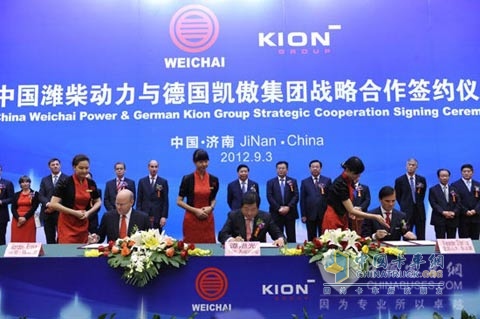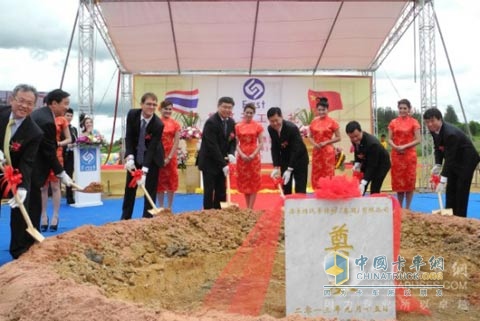Recently, the “big event†in the international auto parts market continued. First, on September 15, 2014, ZF announced that it had spent USD 13.5 billion to successfully acquire the entire share capital of U.S.-based Tianhe and promoted the latter to become the world’s second-largest auto parts supplier. . Later, at the press conference held on September 24, 2014 at the Hanover Motor Show site, Scandinavian President and CEO Martin Lundstedt stated that Scania will cooperate with German Mann to jointly develop heavy-duty gearboxes. It will become another important force in the heavy-duty transmission market.
The international giant was very "busy" and domestic companies were not idle. On October 8, 2014, the first overseas wholly-owned company - Fast, Shaanxi Fast Automotive Transmission Group Co., Ltd. (hereinafter referred to as Fast). Automotive Transmission (Thailand) Co., Ltd. officially started production in Rayong Province, Thailand. At the same time, the company is also Thailand's first commercial vehicle transmission manufacturer.
From the foundation of the foundation in September 2013 to the official start of production in 2014, Fast Thailand completed a transformation of Fast to a truly international road. Like Fast, in recent years, many auto parts companies in China have begun to move toward the international market and even expand overseas. The “western crabs†in the international market are “very good†and carefully combing out several companies. The overseas market development process may provide some inspiration for future development.
Cross-border mergers and acquisitions, due to their strategic needs
Actually, for Chinese auto parts companies, the realization of the internationalization strategy is nothing more than four ways of wholly foreign-funded plant construction, joint venture construction, foreign sales, and overseas mergers and acquisitions. Due to the current economic development level in China, China’s auto parts enterprises are mainly Foreign sales, sole proprietorships and joint ventures are the main factors, while mergers and acquisitions are rarer. Although rare, it does not mean that it is not. Weichai Power “sings all the way†on overseas acquisitions.

Weichai Acquires German Kio Equity Signing Ceremony
In January 2009, Weichai acquired the French Baudouin company and expanded its entire range of engine industries. In January 2012, it reorganized Ferretti, the world's largest luxury yacht manufacturer, to expand the group's industrial chain; In December, the company strategically reorganized the German KION Group. By July 2014, the EU finally approved Weichai Power to acquire the KION Group.
Weichai's acquisition of the "trilogy" seems smooth, not accidental. Each step comes from the actual needs of Weichai. Such as the acquisition of the KION Group, is due to the business sector in Weichai, hydraulic control system technology lags behind, lack of core component technology. At that time, the KION Group, due to the impact of the international financial crisis, had a high level of liabilities and a heavy financial burden, and could not meet the requirements for a public listing, and was in urgent need of capital structure restructuring. This creates an opportunity for Weichai to implement mergers and acquisitions. Through mergers and acquisitions, Weichai has taken control of the core technical resources of the global hydraulic control system, solved the lack of core technologies for hydraulic control systems, and single-engine construction business and other issues.
Weichai Power Chairman Tan Xuguang once summed up Weichai's mergers and acquisitions: Through the acquisition of the French Baudouin company, Weichai has accumulated valuable experience in operating international companies; through the reorganization of the Italian Ferretti Group, Weichai achieved a major breakthrough in structural adjustment. Through the acquisition of Kai Lun Linde Hydraulics, Weichai controls the core technical resources of the global hydraulic control system. And it is this "trilogy" that has enabled Weichai to achieve a leap from its domestic layout to a global one.
Establishing factories overseas, “curves save the country†to open up the international market
Southeast Asia has always been a sacred place for major international automobile and accessory industry groups to invest in, and the very rich rubber resources in Southeast Asia has also attracted many tire companies to build factories here. According to statistics, at least five tire companies in China build tire factories in Southeast Asia.
Sailun Group Co., Ltd. is the first crab-eater to invest and build factories overseas in China's tire industry. It invested in the establishment of a wholly-owned subsidiary Sai Wan (Vietnam) Co., Ltd. in Vietnam. The target market positioning of this subsidiary is to focus on sales in the international market, taking into account the automobile accessory market and the replacement of the tire market in neighboring countries and regions in Vietnam, and to implement the internationalization development strategy for the racing wheel and enhance the influence of the racing wheel brand in the overseas market. Significance.
Shandong Linglong Tire Co., Ltd. also set up an overseas production base in Thailand, making full use of Thailand's abundant resource advantages, trade advantages, and location advantages, breaking raw material bottlenecks and trade barriers, and establishing the international market brand image of Delicate Tyre. In addition, such as the construction of Ogrey tires in Jakarta, Indonesia, the Delta Group in Russia to build factories, an increasing number of Chinese tire companies have accelerated the world's layout.
The establishment of factories abroad can effectively avoid trade barriers. According to a person in charge of a tire company, building a factory abroad can be a means for tire companies to respond to foreign anti-dumping measures. If any product encounters anti-dumping, which kind of product can be produced locally, a new type of “foreign production, foreign sales†will be formed. Market strategy.
Step by step to meet the natural needs of overseas markets
If some tire companies like the ones mentioned above are setting up factories overseas, they are more concerned with the need to avoid trade barriers. This time, Fast's Thai factories are due to the natural needs of their own development.

Groundbreaking Ceremony of Fast Automotive Transmission (Thailand) Co., Ltd.
All operating indicators ranked first in China's gear industry for 11 consecutive years. Heavy-duty transmission production and sales volume ranked first in the world for 8 consecutive years. The transmission market has more than 5 million units, and the domestic market share exceeds 70%... This set of data is Fast has achieved brilliant results in the domestic and foreign markets, but Fast is not satisfied with this. Not long ago, David Dakai, chairman of the Fast Group, said in an interview: "Faster must not only sell products to the international market, but also occupy a place in the international market, especially in the European and American markets!" Li Dakai's remarks indicate the law. Stet's determination to enter the world brand.
The establishment of a plant in Thailand is an important step for Fast to move into a global brand, and it is also an expression of the natural needs of overseas markets. It is understood that Fast Thai Thailand mainly produces 6-speed, 9-speed, 12-speed, and 16-speed dual-shaft transmissions with independent intellectual property rights and is the only designated supplier of Volvo Thailand's commercial vehicle projects.
“The main reason that Fastland dares to build overseas plants is that Fast's products have passed the rigorous review of Volvo, which is to effectively meet Volvo's product supply requirements, which also shows that Fast has gained recognition in the international market.†Li Dakai said, "In addition to meeting the needs of Delfo's products, Fast established factories in Thailand can also radiate the Southeast Asian market." Sufficient market demand is a profit guarantee for overseas factories. In addition, at the end of 2015, after the establishment of the ASEAN Economic Community, relevant tax reduction and exemption policies will also help Fast to participate in international market competition.
There are still deficiencies, overseas "expansion" needs to be first "housekeeping"
Whether it is Weichai or Fast, or even many tire companies, the road to “overseas expansion†of Chinese auto parts companies seems to be smooth. However, for more Chinese parts companies that have the idea of ​​“going outâ€, they need to “prepare carefullyâ€. Like the once overseas "expansion" of Fuyao Glass, it still needs everyone's attention.
“At present, the overall development of China’s auto parts industry is still not mature enough. Many companies have poor R&D capabilities, and their technological foundation is not solid. It is difficult to estimate the risks of blind investment in overseas companies. For most companies, they should also establish a private plot and set up in China. After the high-end brand image, accumulated rich marketing experience, and the establishment of a sound service concept, it will implement an internationalization strategy.†For the overseas expansion of auto parts companies, Chen Yuanzhi, Director of the Parts Department of China Automobile Industry Association, once stated.
Parts companies need to analyze specific conditions when going overseas. For example, how to build plants overseas, different countries and regions, different products, different production methods, and the dependence of products on raw materials will all affect whether or not the plant can be built. victory. Therefore, the most important point is that the external expansion of the parts and components companies must first manage the “housekeeping†first, and firstly establish a good position in the domestic market, and then think outside the company.
PTFE lined elbow is a type of pipe fitting that is commonly used in industries where highly corrosive fluids are transported. The elbow is made of two parts – the outer shell, which is typically made of carbon steel or stainless steel, and the inner lining, which is made of PTFE (polytetrafluoroethylene).
PTFE is a synthetic fluoropolymer that is known for its exceptional chemical resistance, high temperature resistance, low coefficient of friction, and non-stick properties. These properties make PTFE an ideal material for lining pipes and fittings that are used in industries such as chemical processing, pharmaceuticals, food and beverage, and water treatment.
The PTFE lining in the elbow provides a barrier between the corrosive fluid and the metal surface of the elbow, protecting the metal from corrosion and extending the life of the pipe fitting. PTFE lined elbows are also resistant to scaling and fouling, which can reduce the efficiency of the fluid transport system.
Ptfe Lined Elbow,Steel Ptfe Lined Elbow,Chemical Ptfe Lined Elbow,Ptfe Lined Lining Steel Pipe
Rayhot Technology Group Co,.Ltd , https://www.rayhotgroup.com
